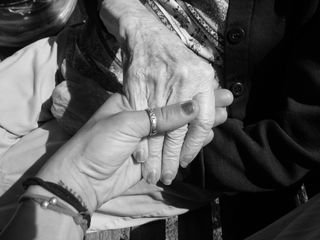
When most of us hear the term doula we automatically think about a woman who assists in the birthing process. Birth doulas have probably been around since women have been having babies, providing help and support to them during childbirth. The word itself comes from the Greek word meaning “woman helping another woman.” Today, there is the emergence of a new health professional, a different type of doula who provides end of life care in a similar manner to birth doulas. They are called death doulas, doulas for the dying, end of life doulas, death midwives or spiritual midwives. Their purpose is to be with the dying until death. They are there to assist the passage from this world to the next.
One of the larger and better known training groups is the International End of Life Doula Association (INELDA). It was founded in 2015 by Henry Fersko-Weiss who has recently authored the book Caring for the Dying: The Doula Approach to a Meaningful Death. In his book, he outlines the basic functions of the doula and their general activities. A doula is there to provide physical, psychological, spiritual, and emotional support not only to the patients but to the family as well. At the present time, there is no state or national regulatory body that certifies the doulas. However, after completing a training program, the doulas have the support of the National Hospice and Palliative Care Organization. The training experience itself can have a profound effect on the doulas- to- be. Many of the women and men who go through the training say that it is a spiritual calling for them. They also comment on how privileged they feel to know someone on such a deeply intimate level and to be with them at their death. Many of the doulas feel that they are forever changed by their experiences.
According to Fersko-Weiss, there are three different areas that are addressed by the doulas,
“The first of these involves the dying person reflecting on their life and planning for how they envision the last days of life to unfold. The second centers on holding the space for the plan of those last days, when the body is finally breaking down. The last part of the program begins shortly after the person dies, as family and friends process their experiences of the dying time and begin their work on grief.”
One of the most important things that a doula does is to actively engage the one who is dying in the entire process. It gives them a voice that often is denied to them. Doulas ask a lot of who, what, how, and where questions. Who do you want at your bedside as you are dying? What music would you like to hear? What type of bed would you like to be in, hospital or your own? Where would you like the bed? Doulas ask a lot of questions but more importantly they listen to what the dying want and need and do whatever they can to fulfill their requests. One of the primary goals of a doula is to help the dying create their living legacy. This is a project that helps the dying to review and to explore the meaning of their life. The legacy project can take many forms and is only limited by one’s imagination. Sometimes the legacy can take the form of a scrapbook or a collage. Some have made audio or video interviews. This legacy project is something the family will always have to remember their loved one by and to pass on to other generations.
Doulas are there to assist the family as well as the dying. They serve as a guide through this most difficult of times, providing them with emotional and spiritual support. Doulas give the family time to rest or to do other chores of daily living. They help the family to understand more about the dying process and what some of the issues are that they and their loved one is confronting. Family members can sleep at night knowing that the doula will alert them if significant changes occur to their loved ones’ status. The doula is also available after the death to help the family in the initial stages of grief.
Death doulas are becoming better known and more people are utilizing their services. However, it may be that there are no doulas where you live. There are many things that we can learn from them that we can use when we are with the dying. Perhaps one of the most important is to be there with the person. Your presence is so important. We can be patient, kind, supportive, and non-judgmental. We can include the dying in decision making. Finally, we can educate ourselves about the dying process and speak openly about what is happening.
References
Fersko-Weiss (2015). Caring for the Dying: the Doula Approach to a Meaningful Death. Conari Press. Newburyport, MA.


